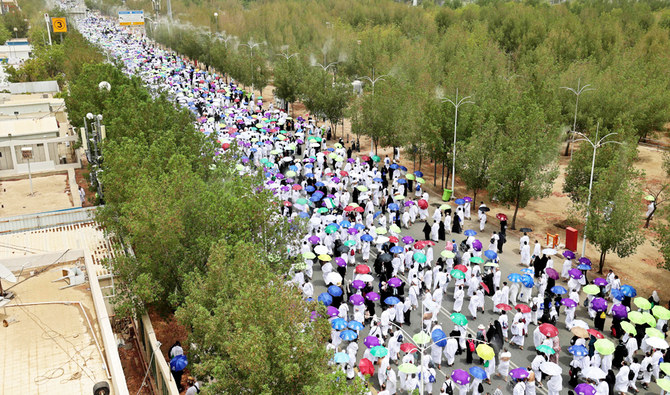MAKKAH: Diplomats in Saudi Arabia have been sharing their experience of this year’s Hajj, which was a first for some and undertaken during the ongoing pandemic.
With just 60,000 people performing Hajj in 2021, great efforts were made to ensure that the pilgrims were able to complete their rituals safely.
It was the first Hajj for Mahmoud Alnashrati, a consul at Egypt’s embassy in Riyadh. He met many people from different backgrounds and said that performing Hajj was a chance to exchange experience and religious knowledge with others.
“Being at Mount Arafat, moving from one holy site to another had a huge value no one can deny,” he told Arab News. “May Allah Almighty help everyone to experience this beautiful journey because hearing about it is something and the experience is another thing.”
Mohamed Qasim Jibril, who is South Africa’s consul general in Jeddah, said that his most special moment was the Day of Arafat. “There were few pilgrims but there was a heightened sense of spirituality, knowing that this is the day that Allah forgives all those who are present on this day, and Allah makes his angels witness that he is forgiving them all.

Muslim worshippers set out to perform a symbolic stoning of the devil ritual, as part of the Hajj pilgrimage in Mina, near Saudi Arabia's holy city of Makkah, on July 20, 2021. (AFP)
“I would really like to thank the Custodian of the Two Holy Mosques King Salman and his son Crown Prince Mohammed bin Salman for all the great efforts made in this Hajj.”
FASTFACT
With just 60,000 people performed Hajj in 2021, great efforts were made to ensure that the pilgrims were able to complete their rituals safely.
Endang Jumali Uman is Indonesia’s Hajj and Umrah consul in Jeddah. He said that, although he had performed Hajj in the past, this year’s pilgrimage had really caught his attention. “As I was in the holy sites, I noted many developed services regarding catering, beds, and the use of technology. Clearly, there is an amazing collaboration between related sectors and Hajj companies to offer the best services.
“One of the things that I really liked was facilitating moving pilgrims from one site to another, especially at the Jamarat phase. It would be really great if the ministry was able to apply the same services for the coming Hajj seasons.”
Abu Nasr Shuja Akram, from Pakistan’s consulate in Jeddah, performed Hajj for the second time but said there was a special feeling with every pilgrimage. “You really feel that you are spiritually connected with the almighty and he is listening to you.” He, too, welcomed the efforts made by the king, the crown prince, and Saudi authorities for making this year’s pilgrimage an exceptional one, as well as for ensuring high levels of safety for everyone present.


























